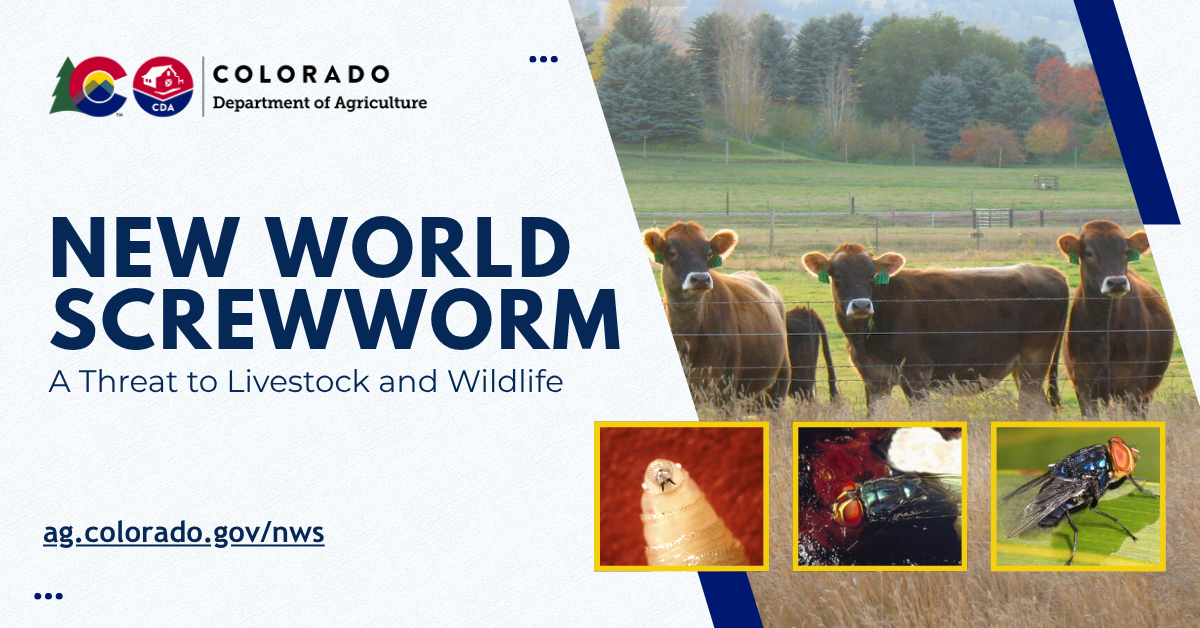The Colorado Department of Agriculture (CDA) is urging livestock and poultry owners to remain vigilant and monitor their animals for symptoms of New World Screwworm (NWS) and Highly Pathogenic Avian Influenza (HPAI). Recent detections of NWS in Mexico, close to the Texas border, and an increase in HPAI cases across the nation, including wild bird detections in Colorado, highlight the importance of preparedness and prompt reporting. There are currently no known cases of screwworm in Colorado or the United States.
“The recent detections of New World Screwworm in northern Mexico underscore the critical need for continued vigilance in surveillance and reporting,” said Dr. Maggie Baldwin, Colorado State Veterinarian. “We have been working on a comprehensive New World Screwworm response plan for Colorado, and we are prepared to coordinate with local, state, and federal agencies to implement measures such as quarantine, treatment, movement restrictions, and sterile insect technique if a case is detected.”
 For NWS, veterinarians are advised to contact the State Veterinarian’s office immediately if they suspect a case. Key steps include inspecting animals traveling internationally, carefully documenting suspected myiasis infestations with photos and videos, recording travel history, and saving larvae for testing in 70% ethanol or isopropyl alcohol. Please see the CDA Screwworm webpage for additional information.
For NWS, veterinarians are advised to contact the State Veterinarian’s office immediately if they suspect a case. Key steps include inspecting animals traveling internationally, carefully documenting suspected myiasis infestations with photos and videos, recording travel history, and saving larvae for testing in 70% ethanol or isopropyl alcohol. Please see the CDA Screwworm webpage for additional information.
Regarding HPAI, the recent increase in detections across the nation and among wild birds in Colorado signals the start of migration season, during which migrating birds act as a reservoir for the disease. While Colorado has not seen domestic poultry detections since March, there have been multiple detections of HPAI in wild birds across the state this fall: an owl, three turkey vultures, and two red-tailed hawks in Larimer, Weld and Gunnison counties. These wild bird cases indicate the virus is circulating in the central flyway and are a reminder that poultry owners should implement strict biosecurity measures to protect their flocks during this migration season.
“The detections of HPAI in wild birds in Colorado are similar to reports from other wildlife agencies in nearby states and provinces,” said CPW State Wildlife Veterinarian Dr. Peach Van Wick. “CPW relies on public observation and reporting of sick or dying wild birds and urges the public to contact their local CPW office to report suspect cases."
Colorado has not had any human cases of HPAI since the summer of 2024.
“The Colorado Department of Public Health and Environment (CDPHE) is committed to working closely with CDA and other partners to ensure the safety of Coloradans,” said Dr. Allison Kohnen, State Public Health Veterinarian. “It’s important to avoid contact with sick or dead wildlife without the proper personal protective equipment (PPE).”
HPAI in poultry, dairy cattle, or other livestock species must be reported directly to the State Veterinarian’s Office. Suspected HPAI feline cases can be reported to CDPHE, and they will share that information with CDA. A delay in reporting can lead to a delay in necessary response measures which can compromise human and animal health. For more information on HPAI, please see our CDA HPAI landing page.